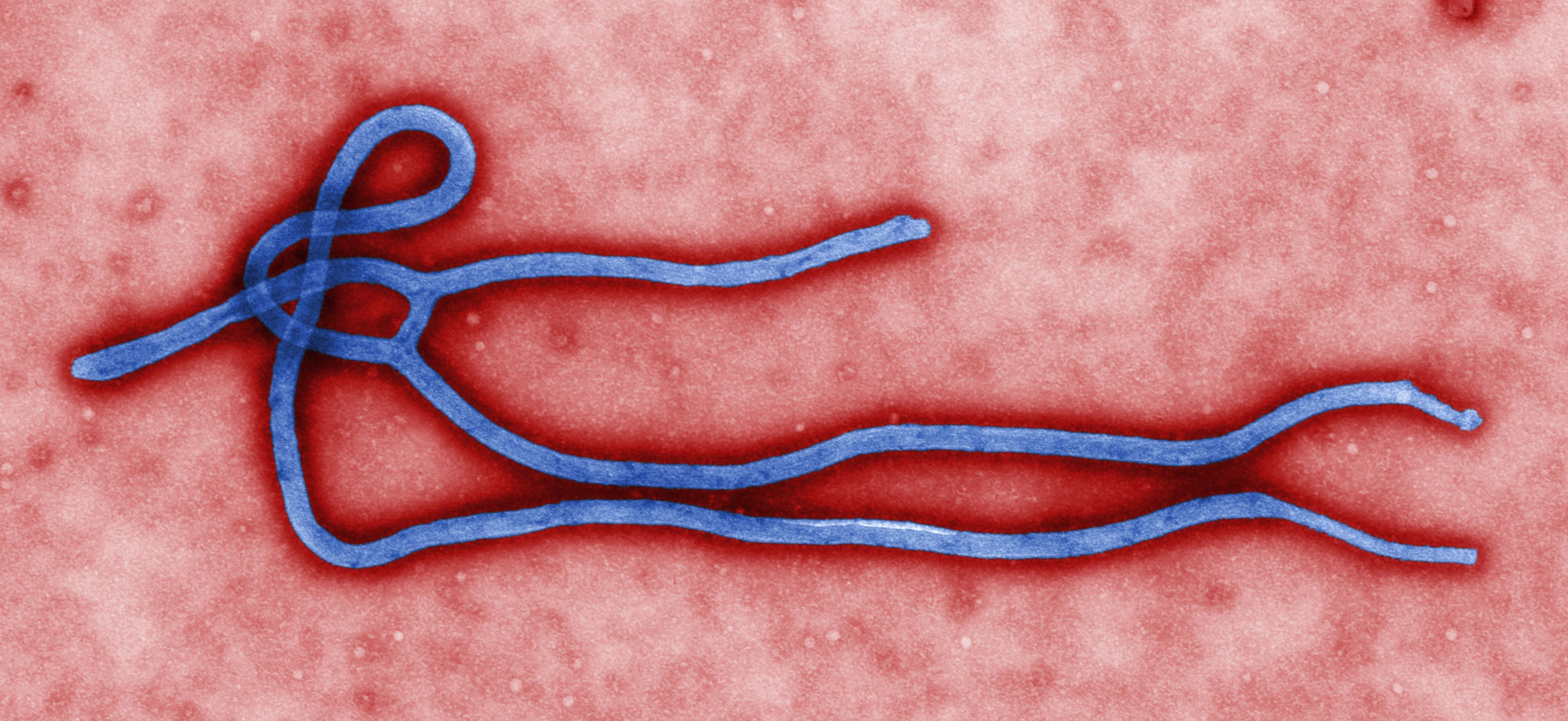In the photo, the little body barely makes a bump under the white sheet.
Strangers, dressed in head-to-toe protective clothing, are taking the girl’s body away. Was her last memory of those same strangers attending to her after her mother died of a disease she could not understand?
Then, Ebola killed her too.
The photo caption says, “The girl, who watched her mother grow sick and die of the virus, died alone and terrified.”
That is just one snapshot of what daily life is like in West Africa now that Ebola has killed 3,865 and affected 8,033 as reported by the World Health Organization on Oct. 5. WHO also stresses that cases are being underreported.

A colorized transmission electron micrograph of the Ebola virus. Photo courtesy of the CDC, Cynthia Goldsmith
The Center for Disease Control and WHO, as well as many medical experts, have said that Ebola is only transmitted from human to human by bodily fluids and that it is harder to catch than the common cold.
With little danger of catching the disease, why should the Ebola outbreak in West Africa matter to the rest of the world?
Look again, there is a little girl in that photo.
Fear and compassion
Ebola is not a major threat in the U.S., but it is devastating to countries who had little health care infrastructure before the virus came and have far less now, said Dr. Tim Jones, state epidemiologist for the Tennessee Department of Health, and a lifelong United Methodist.
Even though the U.S. has just experienced the first case and death of someone infected with Ebola in West Africa but diagnosed after coming to the U.S., Jones is certain the disease will never spread here as it has in countries that have few resources to fight the outbreak or treat patients.
What weighs heavier on his mind is the awful price Ebola is extracting on our neighbors in West Africa.
“From a Christian perspective of caring about and taking care of our neighbors, it is easy for us not to appreciate how much this is affecting the general society there.”
People are losing family members and then being shunned by their communities. There are food shortages, schools are closed and people are being told to stop many of their cultural norms, such as hugging or kissing the dead.
“When you have people deeply entrenched in social customs and suddenly someone is saying you can’t go to your mother’s funeral … we need to be remembering that in our prayers,” Jones said.
“I think there are going to be a lot of long-term devastating consequences to this even when the medical aspect comes under control,” he said. “For every case there is a family, a community, church members … all of whom are going to experience deep needs.”
Responding to the need
A humanitarian response is desperately required. “It is really important for everyone, including the safe community, to do everything we can to support and respond to the need,” Jones said.
He said several of his colleagues who work with the Center for Disease Control have been deployed to West Africa.
President Barack Obama has sent the military to build 17 hospitals. Jones said he could be needed if the frontline medical people are so overburdened that they start asking for other experienced health care volunteers.
“This is really a situation where volunteers are great and resources of various groups and agencies is great, but we absolutely … need to avoid any situation where people are going over there independently and not coordinating with other agencies (like the CDC),” he said.
Volunteers also must consider how fragile the health care systems are in these countries.
“Liberia started with a fragile medical situation in the first place, but right now there is one hospital in the entire country that is still open for anything other than Ebola,” Jones said.
People are probably at more risk of getting into a car accident or having a medical emergency such as appendicitis because there is nowhere to go in Liberia for medical care.
Jones warns that people shouldn’t think they can easily get back to the U.S. if there is a medical emergency.
“So far, each of the folks (humanitarians who have gotten Ebola) who have come back have been approved all the way through international regulations. I don’t want to scare people but it is not a situation where you can say ‘I have insurance and I can be medevaced out’ because that is not the case for these three countries right now.”
Different crisis
This health crisis is not like a typhoon or earthquake, Jones said. After the earthquake in Haiti, thousands of people flocked to the country to help – and they could. People know how to clean up and rebuild.
The bright media lights are turned on West Africa now, but those lights will dim.
“We see lots of sad pictures, we put a check in the mail and then we forget quickly,” Jones said. “I think anytime there is a situation like this our prayers and response is really important.”
Jones is not the only one thinking about that.
"Let's keep in mind that, as we speak, there are children on the streets dying of this disease — thousands of them," President Barack Obama told reporters Oct. 7. "Obviously my first job is to make sure that we're taking care of the American people, but we have a larger role than that."
Remember that photo?
Gilbert is a multimedia news reporter for United Methodist News Service. Contact her at (615) 742-5470 or [email protected].
Like what you're reading? Support the ministry of UM News! Your support ensures the latest denominational news, dynamic stories and informative articles will continue to connect our global community. Make a tax-deductible donation at ResourceUMC.org/GiveUMCom.




